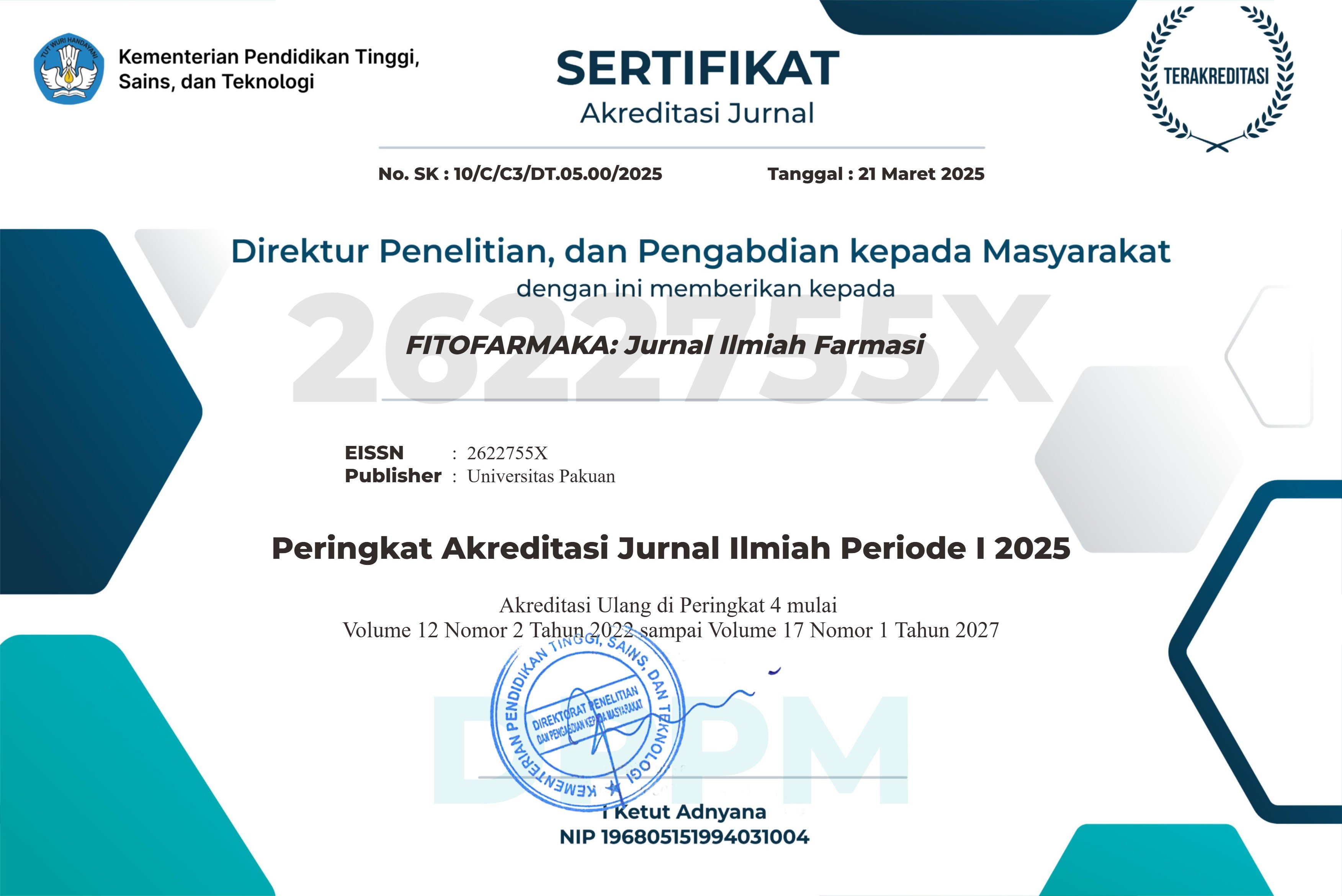Analysis of Public Knowledge Related to Antibiotic Usage and Its Impact on Antibiotic Resistance
DOI:
https://doi.org/10.33751/jf.v15i1.31Keywords:
antibiotic resistance, bacterial infection, descriptive observational study, inflammation, rational behaviorAbstract
Antimicrobial resistance (AMR) is a critical global health threat, exacerbated by inappropriate antibiotic use. This study aims to analyze the public knowledge level of antibiotics and their correlation with the prevalence of antibiotic-resistant bacteria in the city. This prospective, descriptive observational study, conducted in Bogor City from March to May 2025, analyzed antibiotic usage patterns and knowledge among 191 residents aged 17 years who had previously used antibiotics. The majority of respondents were female (88.5%) and homemakers (78.5%). A high prevalence of antibiotic use (95.8%) was reported, with amoxicillin being the most frequently used (82.2%). Notably, 2.1% of respondents mistakenly identified non-antibiotics. While doctors (60.7%) were the primary source of recommendation, some obtained antibiotics based on advice from neighbors (2.6%) or self-medication (1.6%). The average knowledge score was 62.3%, with 15.7% having low knowledge. Misconceptions existed, as only 69.1% correctly identified antibiotics' use for bacterial infections, and only 48.2% knew they don't treat inflammation. Concerning behaviors included purchasing antibiotics without a prescription (19.4%) and stopping prematurely due to symptom relief (17.3%). A significant positive correlation (r=0.45,p<0.001) was found between knowledge and rational behavior. This study underscores the need for targeted educational interventions in Bogor City to address knowledge gaps and reduce risky antibiotic use practices to combat AMR, especially antibiotic resistance. In conclusion, this study conducted in Bogor City between March and May 2025 revealed a high prevalence of prior antibiotic use among residents, alongside identified gaps in public knowledge regarding their appropriate application.
References
Arikunto. 2006. Prosedur Penelitian Suatu Pendekatan Praktek. Jakarta : PT. Rineka Cipta.
Arrang, S. T., Cokro, F., & Sianipar, E. A. (2019). Rational Antibiotic Use by Ordinary People in Jakarta. MITRA: Jurnal Pemberdayaan Masyarakat, 3(1), 73–82.
Badan Penelitian dan Pengembangan Kesehatan Kementerian Kesehatan RI. (2018). Riset Kesehatan Dasar. Jakarta: Kementerian Kesehatan RI.
Biro Komunikasi dan Pelayanan Masyarakat, Kementerian Kesehatan RI. (2022, November 19). Resistensi Antimikroba Ancaman Kesehatan Paling Mendesak, Strategi One Health Perlu Digencarkan. sehatnegeriku.kemkes.go.id. Retrieved from https://sehatnegeriku.kemkes.go.id/baca/rilis-media/20211119/2238877
Efendi, R., Sudarnika, E., Wibawan, I. W. T., & Purnawarman, T. (2022). An assessment of knowledge and attitude toward antibiotic misuse by small-scale broiler farmers in Bogor, West Java, Indonesia. Veterinary World, 15(3), 707–713.
Fymat, A. L. (2017). Antibiotics and Antibiotic Resistance. Biomedical Journal of Scientific & Technical Research, 1(1), publikasi 5 Juni 2017, ISSN 2574-1241.
Grant, J & Le Saux, N. (2021). Duration of antibiotic therapy for common infections. J Assoc Med Microbiol Infect Dis Can. 2021 Sep 30;6(3):181–197.
John, L., J., et al. (2011). Drug Utilization Study Of Antimicrobial Agents In Medical Intensive Care Unit of a Tertiary Care Hospital. Asian J Pharm Clin Res, Vol 4(Issue 2), 81-84.
Kementerian Kesehatan RI. (2013). Pedoman Umum Penggunaan Antibiotik. Jakarta: Kementerian Kesehatan RI.
Kementerian Kesehatan RI. (2021). Peraturan Menteri Kesehatan Nomor 28 Tahun 2021 tentang Pedoman Penggunaan Antibiotik. Jakarta: Kementerian Kesehatan RI.
Kurniawati, L. H. (2019). Hubungan Pengetahuan Terhadap Perilaku Penggunaan Antibiotik (Studi Kasus Pada Konsumen di Apotek-Apotek Di Kecamatan Glagah Kabupaten Lamongan) [Skripsi]. Fakultas Kedokteran dan Ilmu Kesehatan, Universitas Islam Negeri Maulana Malik Ibrahim.
Lutsina, N., W. (2021). Penggunaan dan Pengetahuan Antibiotik pada Ibu-Ibu di Puskesmas Oepoi. CHM-K Pharmaceutical Scientific Journal, Vol. 4(No. 1), 255-263.
Mardiati, N., et al. (2021). Knowledge and Attitude of Antibiotic Use among Public in Rural Area of Cempaka, Banjarbaru, South Kalimantan. Borneo Journal of Pharmacy, Vol 4(Issue 3), 238 – 247.
Marsudi, S., A, et al. (2021). Tingkat Pengetahuan dan Perilaku Masyarakat Terhadap Penggunaan Antibiotik di Beberapa Apotek di Kota Ternate. Pharmacy Medical Journal Vol.4(No.2), 54-61.
Qibtiyah, M. (2022, Desember 13). Peran Apoteker Dalam Pengendalian Resistensi Antimikroba Pada Pelayanan Kesehatan. Pertemuan Pengendalian Resistansi Antimikroba, Dinkes Prov Jawa Timur.
Siregar, C., J., P. (2004). Farmasi Klinik Teori dan Penerapan, Penerbit Buku Kedokteran EGC. Jakarta.
Tim Komunikasi WHO. (2022, Oktober 12). Sekarang Saatnya Beraksi Menangkal Resistensi Antimikroba. WHO. Retrieved from https://www.who.int/indonesia/id/news/detail/12-10-2022-time-to-act-to-curb-antimicrobial-resistance-now
World Health Organization. (2023). Antimicrobial resistance. Retrieved from https://www.who.int/news-room/fact-sheets/detail/antimicrobial-resistance
World Health Organization. (2024). WHO releases new pathogens list as a critical tool against antimicrobial resistance. Retrieved from https://www.who.int/indonesia/news/detail/12-07-2024-who-releases-new-pathogens-list-as-a-critical-tool-against-antimicrobial-resistance
World Health Organization. (2025). WHO global research agenda on AMR: Supporting Indonesia’s fight against drug resistance. Retrieved from https://www.who.int/indonesia/news/detail/21-03-2025-who-global-research-agenda-on-amr--supporting-indonesia-s-fight-against-drug-resistance
Downloads
Published
How to Cite
Issue
Section
License
Copyright (c) 2025 FITOFARMAKA: JURNAL ILMIAH FARMASI

This work is licensed under a Creative Commons Attribution-ShareAlike 4.0 International License.








